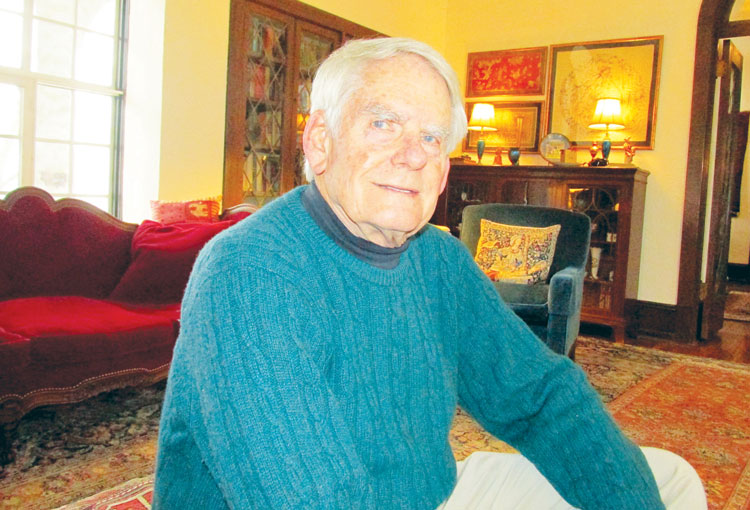
By Anne W. Semmes
Sentinel Features Reporter

It’s been a dozen years or so since Dick Bergstresser ended a six-year turn on the Board of Selectman, during which he interrupted the nearly 20-year GOP reign to become, in 2001, the rare Democrat elected first selectman in a mostly Republican town.
Since then, Dick has been keeping his eye on Greenwich from the comfort of the Spanish-Mediterranean home he shares with wife, Jean, and their sumptuously furry white standard poodle named Emma, who would keep anyone warm on this snowy day on Old Church Road.
Dick is abreast of the present disquiet over a proposed Neighbor to Neighbor building to be constructed behind the Tomes-Higgins property on East Putnam, with some neighbors concerned about a possible loss of views. Dick keeps in mind that the Greenwich Commons open land across from the Tomes-Higgins house is now only a third of its original size. He’s been a watchdog over the town’s open spaces since cutting his teeth in the RTM for 18 years with a primary focus on the town’s Parks and Recreation Department.
Dick sees the changes in the buildup of Greenwich as evolutionary—as consistent with the times. He sees the biggest change in the “affluent” neighborhoods. “Greenwich always had a well-to-do population with large estates,” he said. But “This buildup has been exacerbated by greater wealth accumulation in the financial sector with these people wanting to display their wealth in bigger houses.”
Developers are ever ready to accommodate a millionaire’s need to tear down and build bigger. But the developers, he said, are running out of those kinds of properties. “They’re looking toward the low income neighborhoods,” he said, noting that “Greenwich is a very diverse population and getting more so, and these people want to live and work in Greenwich.”
He also spoke of the evolution of Greenwich Avenue. “There are lots of national chains that have moved in as the rents are so high. The local independents can’t survive as the national retailers have put them out of business.” He adds, “The national retailers haven’t understood they need to participate in town life. They won’t join the Greenwich Chamber or contribute to the holiday lights on the Avenue. Greenwich Green & Clean had to take over.”
He sees the town’s biggest challenge as “Making sure we keep Greenwich’s capital assets up to date—particularly its buildings.” He cites as an illustration MISA, the Music Instructional Space and Auditorium project at Greenwich High School. “We’ve allowed emotion to get in the way of good planning. It should not have had to be done.” Because of budget cuts to the plan of the original auditorium, the space turned out to be “totally inadequate … and there was not a good job of maintenance over the years.”
Dick cited his partnering with Jim Lash to create a capital improvement plan implemented with a charter change during his tenure as first selectman. He called the plan “a major improvement in overseeing town assets. It makes the first selectman responsible for the consolidation of the town’s budget, with the exception of the BOE operating budget. Over the years it’s been developing so we can look out now and see what’s coming.”
Dick calls the defining moment of his two-year term as first selectman the issue of the opening up of public access to Greenwich Point. “This issue was the most interesting time I had in office,” he said. Faced with the uproar over the state Supreme Court’s decision to open public access, he said, “We had to open it up.” Selectman Lolly Prince had favored deferring action for a committee approach, but Dick chose executive action. “They gave me a chance,” he said. “We decided on an entry price.”
Dick recalls the boiling point over the issue when the TV stations covering the raucous hearings had to kill live coverage for fear of ill-considered, and possibly actionable, remarks making it on-air. Meanwhile, Dick discovered the story had surfaced in major newspapers in Germany misstating that “public access would cost beachgoers $350 for entry.” “If I got 10 bucks for everyone apologizing for their comments back then,” he said, “I’d be in the money now, for the thing worked.”
One big stumbling block Selectman Dick found in governing was conforming to the Freedom of Information Act. “In my first term as selectman, there were two Democrats, and Republican Tom Ragland was first selectman. The talk was, how could anything get done? If Tom and I wanted to meet over an agenda, we had to meet in a public place. But it’s hard to negotiate in that mode—you’ve got to allow the informal meetings.”
Dick has regretted seeing “the poor turnout for municipal elections.” “It’s a real tragedy, as we need people to be more aware of the running of the town.” He sees the number of Democrats in the town inching up, as are the numbers of the unaffiliated. “The party label counts during the national elections,” he said, “but less so on local issues.” Though retired, he’s “more than willing to work for any candidate who wants to run for public office.
Dick and wife Jean came to Greenwich in 1968 from California, where they met. IBM brought computer scientist Dick east to work in White Plains. Early on, he had taken his mathematical skills to IBM in California. “I had programmed the IBM 650,” he said. Thus, over 37 years at IBM, he played a part in the evolution of computers. “I was creating operating systems, software, scientific support software, and involved in the early days of creating the internet.”
Dick already had code-breaking skills. He’d served in the military for two years prior to IBM as a cryptographer for the Army Security Agency and had some “low-level” code breaking experience overseas.
He revisited that experience recently while reading a new book on President Eisenhower titled “Ike’s Bluff.” The book deals with how Ike’s strategy of bluffing, first in dealings with Russia and then in a military intervention in Lebanon, brought a calming of warring parties and kept the U.S. out of war. Dick played a bit part as an intelligence reporter with the Army Security Agency during that military intervention in Lebanon.
Dick has kept busy in his retirement years. He’s put his oar in with the Greenwich Land Trust, the Greenwich Point Conservancy, and has served on the Green & Clean Board since he was a selectman. He’s also chaired the board of Round Hill Community Church. As first selectman, he became aware of the rise in domestic abuse in town. “The police were complaining that the worst calls they got were involving domestic abuse.” Patrolmen are now better trained, he said, to deal with those calls. Out of office, Dick brought his support to the YWCA’s Domestic Abuse program and enlisted his church’s support of it.
Dick admits to finally “pulling back to enjoy life.” “I’m a bit slower, so I don’t have time to do all those things.” With the snow falling and winter winds blowing, did Dick and Jean think of moving south? Definitely not. “We truly love Greenwich—it is home.” He’s got his Mediterranean home with the fire crackling inside and the snow falling outside, making it a late but picturesque Christmas card.
But one question remained to be asked: Who did he favor in the presidential race?
His answer was unequivocal. “Hillary is head and shoulders above everybody,” he said. “I have confidence she would do a good job.” He called Donald Trump, on the other hand, “a disaster. Nobody who’s ever worked for him is prominent in his campaign.”




